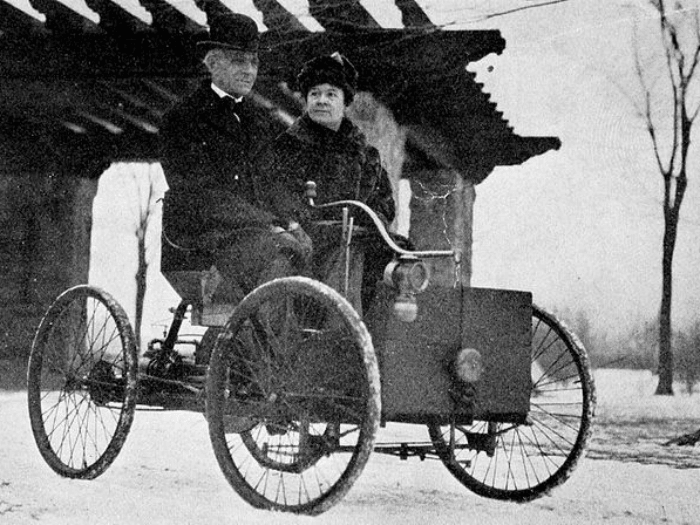by Bradley W. Hart
Over the past century, Ford has become one of the most iconic American brands, from its line of pickup trucks to the Mustang. The company’s first car, the Model T, broke ground and helped create the modern automotive industry. Yet what few people know today is that the company’s founder, Henry Ford, not only held deeply prejudiced personal views but also became one of Hitler’s key American friends in the years before the war. To its credit, the Ford Motor Company has made some efforts to come to terms with this troubling history, but there is still more work to be done. As we’ll see, Ford’s views were more than just a private matter—they translated into real-world action that had a major effect on Germany’s military preparedness before World War II. Certainly, Ford was far from the only American businessman who was enticed by Nazi Germany. His rival—General Motors—had a German division of its own and manufactured aircraft parts for the Luftwaffe.

As I discuss in my book Hitler’s American Friends, some of its executives held views that went beyond pure business interests and bordered on Nazi sympathies. Yet Ford’s story is unique not just because he did extensive business in the Third Reich, but because of the influence he held over Hitler’s other American friends in the United States. This industrial leader was far more than just a mere businessman—he was also an American icon who, like his friend Charles Lindbergh who we’ll discuss in the final part of this miniseries, would become practically obsessed with Hitler and Nazism.
Ford was born on a farm in 1863. After pursuing a career in engineering, he founded the Ford Motor Company in 1903 and introduced the revolutionary Model T five years later. Ford’s manufacturing genius was beyond question — by introducing innovations such as the assembly line and standardized parts, he was able to vastly speed up production of his vehicles and drive down prices. Ford scandalized business opinion by voluntarily paying his workers a whopping $5 per day in 1914, which was more than double their previous wages. At the same time, Ford used his own workers as a market for his vehicles and encouraged them to buy Model Ts for themselves. It worked, and just 10 years after the Model T was released, it accounted for half the cars in the United States. It goes without saying that Ford became a very, very wealthy man, arguably the most famous industrialist in the country.
The Führer once indicated his desire to help ‘Heinrich Ford’ become ‘the leader of the growing Fascist movement in America.’
Despite his industrial genius, though, Ford had a less attractive streak as well. He opposed U.S. entry in World War I, and later adopted the view that the war had been caused by an international plot by Jewish bankers. Conspiracy theories have always been a key component of anti-Semitism, and once one begins to believe one theory, they tend to believe more and more. Anti-Semitic slurs became common in Ford’s conversations, and in the early 1920s he owned a newspaper called the Dearborn Independent that he changed into a viciously anti-Semitic mouthpiece. He began personally distributing huge numbers of the infamous anti-Semitic tract The Protocols of the Learned Elders of Zion. A few years later he was eventually forced to apologize to the country’s Jewish community after losing a libel suit, but it seems that his own views were unchanged. By the mid 1930s Ford was blaming “financiers and money lenders” for both the New Deal and the prospect of another world war. One of his many admirers was Hitler himself, and according to one account the Führer once indicated his desire to help “Heinrich Ford” become “the leader of the growing Fascist movement in America.”
As I mentioned, Ford’s views were not just a private matter—they influenced company policy too. Back in the 1920s, Ford and GE had been competing to buy the German carmaker Opel, which both saw as a great way to enter the German market. GE won the bid and bought Opel, and in return Ford opened an auto plant in the German city of Cologne. This proved to be a lucrative move, and by the start of the war Ford’s interests in Germany were estimated to be worth around $8.5 million.
Continue reading Hitler’s American Friends: Henry Ford and Nazism on the Unknown History channel at Quick and Dirty Tips. Or listen to the full episode below.
The post Hitler’s American Friends: Henry Ford and Nazism appeared first on The History Reader.
Powered by WPeMatico